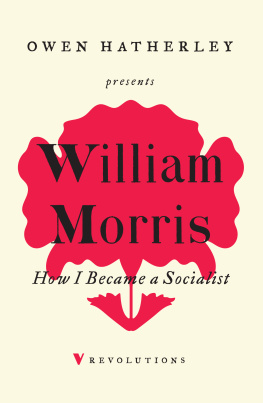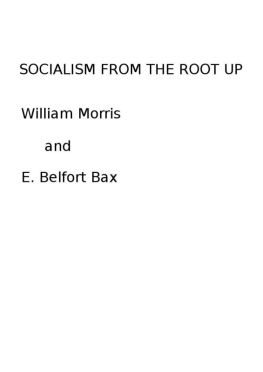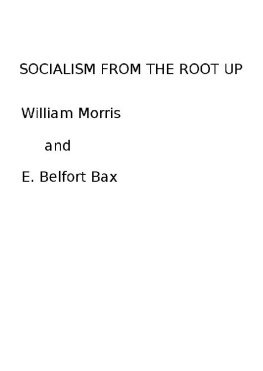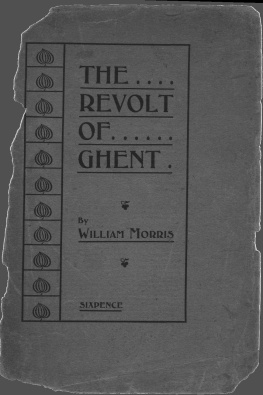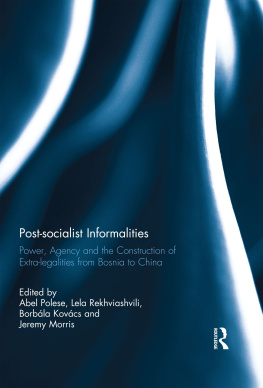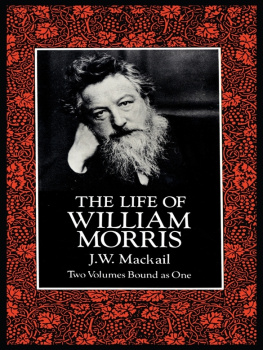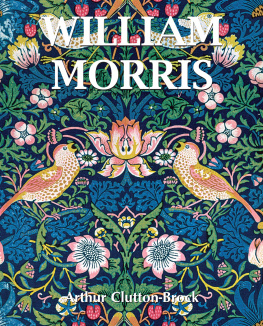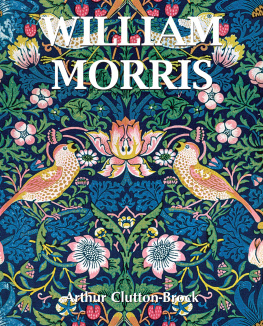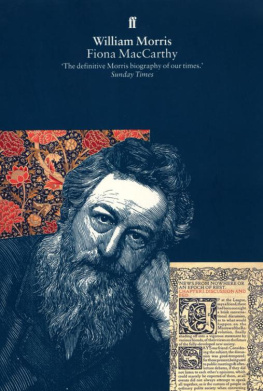William Morris - How I Became a Socialist
Here you can read online William Morris - How I Became a Socialist full text of the book (entire story) in english for free. Download pdf and epub, get meaning, cover and reviews about this ebook. year: 2017, publisher: Verso Books, genre: Science. Description of the work, (preface) as well as reviews are available. Best literature library LitArk.com created for fans of good reading and offers a wide selection of genres:
Romance novel
Science fiction
Adventure
Detective
Science
History
Home and family
Prose
Art
Politics
Computer
Non-fiction
Religion
Business
Children
Humor
Choose a favorite category and find really read worthwhile books. Enjoy immersion in the world of imagination, feel the emotions of the characters or learn something new for yourself, make an fascinating discovery.
- Book:How I Became a Socialist
- Author:
- Publisher:Verso Books
- Genre:
- Year:2017
- Rating:5 / 5
- Favourites:Add to favourites
- Your mark:
- 100
- 1
- 2
- 3
- 4
- 5
How I Became a Socialist: summary, description and annotation
We offer to read an annotation, description, summary or preface (depends on what the author of the book "How I Became a Socialist" wrote himself). If you haven't found the necessary information about the book — write in the comments, we will try to find it.
How I Became a Socialist — read online for free the complete book (whole text) full work
Below is the text of the book, divided by pages. System saving the place of the last page read, allows you to conveniently read the book "How I Became a Socialist" online for free, without having to search again every time where you left off. Put a bookmark, and you can go to the page where you finished reading at any time.
Font size:
Interval:
Bookmark:

How I Became a Socialist

A series of classic texts by revolutionaries in both thought and deed. Each book includes an introduction by a major contemporary writer illustrating how these figures continue to speak to readers today.
How I Became a Socialist

William Morris
Introduction by
Owen Hatherley
Notes and Editors Introduction by
Owen Holland

First published by Verso 2020
Introduction Owen Hatherley 2020
Notes and Editors Introduction Owen Holland 2020
Collection Verso 2020
All rights reserved
The moral rights of the authors have been asserted
1 3 5 7 9 10 8 6 4 2
Verso
UK: 6 Meard Street, London W1F 0EG
US: 20 Jay Street, Suite 1010, Brooklyn, NY 11201
versobooks.com
Verso is the imprint of New Left Books
ISBN-13: 978-1-78873-691-6
ISBN-13: 978-1-78873-693-0 (US EBK)
ISBN-13: 978-1-78873-692-3 (UK EBK)
British Library Cataloguing in Publication Data
A catalogue record for this book is available from the British Library
Library of Congress Cataloging-in-Publication Data
Names: Morris, William, 18341896, author. | Holland, Owen (Literary critic) editor. | Hatherley, Owen, editor.
Title: How I became a socialist / William Morris; with an Introduction by Owen Hatherley; editor's Introduction by Owen Holland; edited by Owen Holland.
Description: First edition paperback. | Brooklyn: Verso Books, 2020. | Series: Revolutions | Includes bibliographical references. | Summary: In essays and lectures, William Morris examines the relation between art and politics, the possibilities for a socialist society, and the crimes of empire, among other subjects. This essential anthology demonstrates Morriss profound commitment to nineteenth-century socialism Provided by publisher.
Identifiers: LCCN 2020029684 (print) | LCCN 2020029685 (ebook) | ISBN 9781788736916 (paperback) | ISBN 9781788736930 (ebk)
Subjects: LCSH: Socialism Great Britain. | Socialism.
Classification: LCC HX243 .M574 2020 (print) | LCC HX243 (ebook) | DDC 335 dc23
LC record available at https://lccn.loc.gov/2020029684
LC ebook record available at https://lccn.loc.gov/2020029685
Typeset in Fournier by MJ & N Gavan, Truro, Cornwall
Printed in the UK by CPI Group (UK) Ltd, Croydon CR0 4YY
CONTENTS
BACK TO THE RED HOUSE
WILLIAM MORRIS AFTER REFORM
AND REVOLUTION
B exleyheath, wrote the architecture critic Ian Nairn in 1966, would be nobodys first choice as the ideal London suburb. The stern classical tenements of Robert Owens early experiment in socialism from above at New Lanark are typical of the period for the Central Belt of industrial Scotland, and theres little new about the cottages that Chartist groups built for themselves so they could own property, and hence vote. The Red House was something else. It was going to mean living, and designing, differently.
The Red House itself is traditional insofar as it uses red brick and wood and tile, and in its steep pitched roofs there is a dreamily medieval aspect; but almost everything about the house and how it has been planned and built is about making it pleasurable to live in. Not formal, not hierarchical, not about keeping up appearances or up with the Joneses. It is a house for living in a revolutionary idea. Famously, in his 1936 book Pioneers of Modern Design, the German migr architecture and art historian Nikolaus Pevsner started modernism right here, in William Morriss warm south-east London house.
The reason why you or I can go there most days of the week and admire it is that it was given to the public in perpetuity by Ted Hollamby, a modern architect best known for his work at the London County Council, where he helmed the dramatic high-rise skyline of the Brandon Estate in Camberwell, and for his time heading up the Lambeth Council Architects Department, where he rejected standardised housing products in favour of mostly low-rise, intimate clusters of houses and flats, each one designed specially for its site. While he was doing this, he moved out to this much more suburban corner of south London, and put a house that had fallen into ruin back together. His will left it to the National Trust, and if you go there now you can still see Hollambys shelves of Marxist books. He, like Morris, was a communist.
William Morris, as he made very clear in his political writings, became a socialist because he thought everybody should be able to live in places like the Red House. This is why he needs to be seen both as designer and as socialist at once a man who spent his life railing against the division of labour should not have his own labours so divided. As Graeme Shankland, another municipal architect and a member of both the William Morris Society and the Communist Party, once pointed out, when Morris signed his membership card for the Social Democratic Federation, he wrote one word on it, Designer. For one who worked in a staggering number of different disciplines poetry, fiction, furniture, stained glass, wallpaper, architecture, printing, typography it was as a designer that he saw himself, and this infused all of his politics.
By and large, socialists discussing Morriss designs tend to overplay their exclusivity. Morris himself, and his firm Morris & Co., worked largely for the wealthy in his own lifetime, something that depressed him, but was the consequence of a refusal to lower his standards. Yet after he died, those inspired by him worked very often for the poor. In the London County Council of the 1890s and 1900s, miniature Red Houses were built for working-class tenants in Tooting and Tottenham. His fellow member of the Social Democratic Federation, Raymond Unwin, would design the first Garden City, at Letchworth, and the first Garden Suburb, at Hampstead both of them more or less explicit attempts to implement Morriss utopian London in News from Nowhere (1890), albeit without the revolution that he considered necessary for it to be built. Municipal employees like Hollamby and Shankland tried to build that in turn, right up until the 1980s. Meanwhile, designers, architects and historians of both disciplines tend to downplay the hard seriousness of Morriss socialism, downgrading it to a utopian eccentricity rather than what it was: a commitment to class struggle and to the Marxian analysis of capitalism.
Morris was a reader of Marx and a friend of Engels, and though he took socialist theory seriously, he saw it as a rather Victorian productivist might, with little interest in abstraction; and he had a healthy scepticism towards the grander claims of theory. In The Society of the Future (1887), he wittily outlines the differences between socialists as visionaries and socialists as theorists, and explains his own willingness to dissent from the Marxian prohibition on making images of the future:
There are, in fact, two groups of mind with whom Social Revolutionists like other people have to deal, the analytical and the constructive. Belonging to the latter group myself, I am fully conscious of the dangers which we incur, and still more perhaps of the pleasures which we lose, and am, I hope, duly grateful to the more analytical minds for their setting of us straight when our yearning for action leads us astray, and I am also, I confess, somewhat envious of the beatitude of their dreamy contemplation of the perfection of some favourite theory; a happiness which we who use our eyes more than our reasoning powers for noting what is going on in the world, seldom or never enjoy.
Next pageFont size:
Interval:
Bookmark:
Similar books «How I Became a Socialist»
Look at similar books to How I Became a Socialist. We have selected literature similar in name and meaning in the hope of providing readers with more options to find new, interesting, not yet read works.
Discussion, reviews of the book How I Became a Socialist and just readers' own opinions. Leave your comments, write what you think about the work, its meaning or the main characters. Specify what exactly you liked and what you didn't like, and why you think so.

